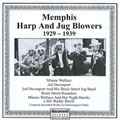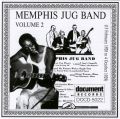"Search Document Records - Minnie Wallace Results "
Viewing 1 to 2 of 2
Memphis Harp & Jug Blowers 1927 - 1939 It just might be that Memphis invented the harmonica blues or at least that they grew up in the city and environs considering the number of major harp players living there. Will Shade, Jed Davenport of neighbouring Tennessee, Noah Lewis from Ripley, Hammie Nixon from Brownsville and later John Lee (Sonny Boy Wiliamson No. 1) Williamson from Jackson, Tennessee. As an indication of the Memphis areas pre-eminence in affairs of the harp we could look at the record company's field trips. For example with over 30 trips each to Atalnta and Texas (compared to just 12 to Memphis) only a hand full of harmonica players were discovered. Atlanta could only muster Palmer McAbee (who may have been white). De Ford Bailey (from Nashville). Birmingham's Jaybird Coleman and a Buddy Moss accompaniment While Texas produced one William McCoy and an unknown accompanist to Hattie Hyde! But more important than mere superiority of numbers is the difference in style; while the other harmonica players were fox-chasing and playing trains (see DOCD-5100) the Memphis men were playing hard blues. More Info on our New Store >> |
||
Memphis Jug Band Vol 2 1928 - 1929 Memphis Jug Band Vol 2 (13th February 1928 to October 1929)
Includes: Will Shade; vocal, guitar; (Casey Bill) Will Weldon, guitar; Vol Stevens, banjo-mandolin; Charlie Polk, jug; Charlie Burse, vocal, guitar; Jab Jones, jug; Hattie Hart, vocal; And others…
Genres: Memphis Blues, Country Blues, Jug Bands
Informative booklet notes by Chris Smith.
Detailed discography.
When the Memphis Jug Band reassembled in September 1928 to cut eight titles for Victor, they began in larky mood. New member (on disc at least) Jab Jones sang what was nominally a tribute to Charles Lindbergh's solo flight across the Atlantic the previous year, but his version of the Lindyhop is a crazy, almost surrealist one. Sugar Pudding, a version of "Take Your Fingers Off It", marked the debut of Jones's thunderous jug, replacing the less forthright Charlie Polk. The other new member was the extrovert Alabaman guitarist and singer Charlie Burse. He was one of the singers on both On The Road Again, whose chorus refers to Monk Eastman's eponymous gang, active in New York in the late 1890s, and the hybrid A Black Woman Is Like A Black Snake, with its 12 bar verse and 8 bar chorus. The cryptic Whitewash Station opened proceedings on 15th September, followed by the Memphis Jug Band’s most famous number, the beautiful Stealin' Stealin', relaxed, nostalgic, and superbly played. The two waltzes that closed the session, though unusual on race records, were probably no novelty to the band, which would have been expected to play such pieces for dancing by both blacks and whites. Continued... More Info on our New Store >> |
||


